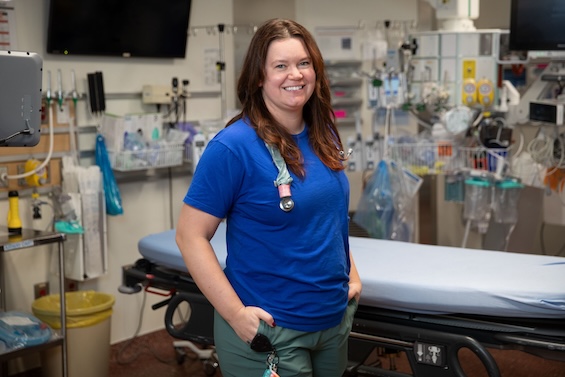The Peer Support and Trauma Response program at The Hospital for Sick Children (SickKids) is there for staff when they need it, and sometimes even before.
When the program began in 2018 – it was the first hospital-wide program of its kind in Canada – the goal was to provide confidential and individual support to any staff member experiencing personal or workplace stress. As the program evolved and matured, the pathways to support have broadened to include group support as well.
The SickKids Paediatric Nursing Orientation (PNO) program has embraced Peer Support to empower “our kind of nursing” at SickKids. By inviting Peers to be part of its Mental Health and Well-being Education Sessions, the partnership aims to help prepare new nurses for the challenges of working in health care and to set them up for success at SickKids. With four cohorts a year of around 100 nurses in each, it’s an opportune time to address aspects of the role not covered in a textbook.
“There’s strong evidence showing that the first year can be the most difficult for new nurses, and it’s during this critical time that they are most likely to leave the profession,” says Kelly McNaughton, Program Manager, Peer Support, SickKids. “This transition period can be extremely difficult for a variety of reasons, and so the goal of the Mental Health and Well-being Education sessions is to help nurses understand the demands of the job, how to get support and, most of all, that they’re not alone.”
At the heart of the well-being sessions is a panel of nurses who are also trained Peers. As an introduction to the Peer Support program, they hear from experienced nurses who speak about topics that aren’t typically spoken openly about. From working night shifts to adjusting to life in a new city, from conflicts with colleagues to mistakes they’ve made at work, the panelists show there’s strength in vulnerability.
Lisa Arce started working at SickKids 15 years ago as a nurse on the Haematology/Oncology unit, and now she’s an Interprofessional Education Specialist responsible for leading the PNO program. The comprehensive orientation lasts three months and takes nurses from the simulation environment to the clinical setting, learning alongside support nurses and preceptors. There’s a lot of ground to cover, with mental health and well-being a much larger component than when she went through the
orientation herself.
“We want to create a safe work environment where we acknowledge the stress nursing can have on staff both professionally and personally, and we don’t expect people to deal with those stressors alone,” Arce says. “We are a community and we want to provide resources for our people to thrive and succeed.”
The Peers offer coping strategies that work for them, as well as additional resources to help them through their adjustment period. They also share key contacts who they can reach out to anytime they need to speak with someone who can relate to their situation.
“It’s such a relief when new nurses hear these stories because they realize their apprehensions are not unique. They gain confidence from their peers who have gone through it before,” Arce says.
Nicole Loureiro, who started at SickKids in 2012 and has spent most of her nursing career in the Emergency Department, is also a member of the Peer Support team and a panelist for the Mental Health and Well-being Education Sessions. She remembers what it feels like to start a new nursing job and makes a point of asking new colleagues how she can help to ease their transition.
Many arrive at SickKids with excellent credentials, but become overwhelmed with feelings of self-doubt as they begin to question if they have what it takes for nursing, Loureiro says, adding that these feelings are natural and she lets them know it’s okay to feel this way.
“We take an ‘ask me anything’ approach and we are very honest with our answers about times we’ve struggled and how we worked through those struggles,” Loureiro says. “I am deeply proud we have this program and also of the work I’m doing to help bring new nurses aboard for the long term at SickKids.”
Looking back, McNaughton says the Peer Support program has come a long way since day one. “We put a program together but didn’t stop there,” McNaughton says. “We have great people to lead Peer Support, as well as great training, and the program will continue to build on its foundation and respond to the changing needs of the organization and our people.”
To learn more about “our kind of nursing” at SickKids and how to join this amazing team, visit the Nursing at SickKids page on sickkids.ca.


